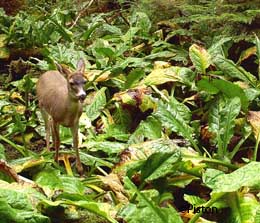Deer are herbivores, which means they primarily eat plants. While deer will nibble on a variety of vegetation, their diet is mostly composed of grasses and other leafy foliage. In the spring and summer months, when these plants are most abundant, deer consume up to 12 pounds of vegetation per day.
Cabbage is not a common part of a deer’s diet, but they will eat it if it is available.
Do Deer Eat Cabbage?
The answer is yes, deer will eat cabbage. In fact, they enjoy eating a variety of vegetables, including broccoli, Brussels sprouts, and kale.
However, they typically prefer to munch on these greens in the wild rather than in your garden. So if you’re seeing deer in your yard chomping down on your carefully cultivated cabbage patch, it’s time to take action to protect your plants!
Do Rabbits Eat Cabbage
Cabbage is a leafy vegetable that is often included in salads and other dishes. It is also a favorite food of rabbits. While cabbage is not poisonous to rabbits, it can cause gastrointestinal issues if they eat too much of it.
Cabbage is high in fiber and water content, which can lead to diarrhea and other digestive problems in rabbits. It is important to feed your rabbit cabbage in moderation and to always offer fresh, clean water.

Credit: www.adfg.alaska.gov
Is Cabbage Harmful to Deer?
No, cabbage is not harmful to deer. In fact, it is a good source of food for them. Deer eat a variety of plants and vegetables, and cabbage is one of their favorites.
Cabbage is high in fiber and nutrients, and it helps them stay healthy and fit.
What Animal Eats Raw Cabbage?
There are a number of animals that eat raw cabbage. Cabbage is a leafy vegetable that is high in vitamins and minerals, making it a nutritious food for many animals. Deer, rabbits, groundhogs, and sheep all enjoy eating raw cabbage.
Cattle and pigs will also eat cabbage, though they typically prefer other foods.
Do Deer Eat Heads of Cabbage?
Yes, deer will eat the heads of cabbage. In fact, they will eat just about any part of the plant. This includes the leaves, stem, flowers, and even the roots.
What Vegetables Will Deer Not Eat?
There is a lot of debate among hunters and gardeners about what vegetables deer will and will not eat. Some people swear that deer will eat anything, while others claim that there are certain veggies that deer simply won’t touch. So, what’s the truth?
Well, it turns out that both groups are partially right. Deer are generally willing to try new things, but there are definitely some vegetables that they’re not particularly fond of. Here are a few examples:
1. Cabbage – For some reason, deer seem to really dislike cabbage. They’ll sometimes take a bite or two out of a cabbage plant, but they usually leave most of it behind.
2. Broccoli – Like cabbage, broccoli isn’t high on the list of favorite foods for deer.
They may nibble on it occasionally, but they won’t do serious damage to your plants if you have them in your garden.
3. Beans – Green beans, soybeans, and other types of beans are also generally avoided by deer. Again, they may take a bite here or there, but they’re not likely to do serious harm to your plants.
4. Corn – Deer love corn (and many other grains), so this one might surprise you. However, mature corn is actually fairly tough for deer to digest properly and as a result, they usually avoid it unless they’re absolutely desperate for food.
Deer eating a Cabbage,
Conclusion
There are many different types of deer, and they all have different diets. Some deer eat mostly plants, while others eat mostly meat. However, almost all deer will eat some plants at some point in their lives.
Cabbage is a type of plant, so it is not surprising that deer will sometimes eat cabbage.
Deer usually only eat cabbage when other food is scarce. This means that if there is plenty of other food available, deer will usually not bother with eating cabbage.
However, if there is not much other food around, deer may turn to eating cabbage as a way to survive.
So, do deer eat cabbage? Yes, they can and do occasionally eat this type of plant.
However, it is not something that they actively seek out or enjoy eating very much.
